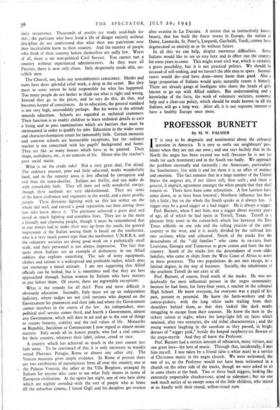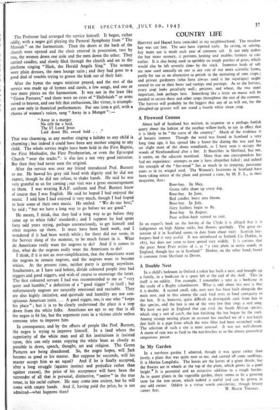PROFESSOR BURNETT
By M. W. PALMER
IT is easy to be dogmatic and sentimental about the coloured question in America. It is easy to settle our neighbours' pro- blems when they are not our own ; and one says facilely that in the North the negro has been treated too well (because he is not yet ready for such treatment) and in the South too badly. We approach the problem externally and rationally ; the Americans, particularly the Southerners, live with it and for them it is an affair of instinct and emotion. The fact remains that in a large number of the United States the negroes are, if not slaves still, then serfs ; and there is general, if implicit, agreement amongst the white people that they shall remain so. There have been some relaxations. A few barriers have come down, or at least been lowered ; Northern influence has been felt a little ; but on the whole the South speaks as it always has. A nigger may be a good nigger or a bad nigger. He is always a nigger.
Prof. Burnett, when I met him, was a nigger about seventy years of age, all of which he had spent in Terrell, Texas. Terrell is a pleasant little town in the cotton-belt which lies between the East Texas oilfields on one side and the rolling prairies of the cattle country to the west, and it is neatly divided by the railroad into two sections, white and coloured. North of the tracks live the descendants of the " old families " who came in ox-carts from Louisiana, Georgia and Tennessee to grow cotton and farm the new country. South of the tracks live the descendants of even older families, who came in ships from the West Coast of Africa to assist in these processes. The two populations do not mix except, to a limited degree, in the way of business. Socially, the inhabitants of the southern Terrell do not exist at all.
Prof. Burnett, of course, lived south of the tracks. He was un- doubtedly the most influential person in the negro community. because he had been, for forty-four years, a teacher in the coloured High School. He knew everyone, for everyone was a pupil of his. past, present or potential. He knew the farm-workers and the cotton-pickers, with the long white sacks trailing from their shoulders behind them, so that they looked like dark moths struggling to escape from their cocoons. He knew the men in the rickety saloon at night, where the lamp-light fell on faces which retained, after two centuries, the old tribal characteristics ; and the young women laughing in the sunshine as they passed, in bright dresses of " nigger pink," beside the heaped raspberry-ice flowers of the crepe-myrtle. And they all knew the Professor.
Prof. Burnett had a certain amount of education, many virtues, and one great love—the love of music. Through that, incidentally, I met him myself. I was taken by a friend (also a white man) to a service of Christmas music in the negro church. We were welcomed, the two of us, as the Professor would not have been welcomed in a church on the other side of the tracks, though we were asked to sit in some chairs at the back. Two or three buck niggers, looking like extremely respectable chuckers-out, acted as sidesmen ; but no one took much notice of us except some of the little children, who stared at us fixedly with their round, yellow-irised eyes.
The Professor had arranged the service himself. It began, rather oddly, with a negro girl playing the Pastoral Symphony from "The Messiah" on the harmonium. Then the doors at the back of the church were opened and the choir entered in procession, two by two, the women down one aisle and the men down the other. They carried candles, and slowly filed through the church and on to the platform singing "Hark, the Herald Angels Sing." The women wore plain dresses, the men lounge suits ; and they had gone to a good deal of trouble trying to grease the kink out of their hair.
After the hymn the negro minister prayed, and the rest of the service was made up of hymns and carols, a few songs, and one or
two more pieces on the harmonium. It was not in the least like "Green Pastures," and there were no cries of "Hallelujah " or arms raised to heaven, and one felt that enthusiasm, like virtue, is triumph- ant now only in theatrical performances. For one item a girl, with a chorus of women's voices, sang " Away in a Manger ":— " Away in a manger No crib for a bald,
The Lawd Jesus Laid down His sweed haid . . .
That was charming, as any mother singing a lullaby to any child is charming ; but indeed it could have been any mother singing to any child. The whole service might have been held in the First Baptist, the First Methodist, the First Presbyterian, or even the Episcopal Church "over the tracks ": it seas just a not very good imitation. But then they had never seen the original.
After the service was over my friend introduced Prof. Burnett to me. He bowed his grey old head with dignity and he did not expect, though he did not refuse, to shake hands. He said he was very grateful to us for coming ; our visit was a great encouragement to them. I was wearing R.A.F. uniform and Prof. Burnett knew of course that I was English. He said he hoped I had enjoyed the music. I told him I had enjoyed it very much, though I had hoped to hear some of their own music. He smiled. " We do our best," he said ; " but we have a long way to go before we are good."
He meant, I think, that they had a long way to go before they came up to white folks' standards ; and I suppose he had spent forty odd years trying, perhaps unconsciously, to get himself and other negroes up there. It must have been hard work, and I
wondered if it had been worth while ; for there did not seem, in the Service slang of the moment, to be much future in it. What do Americans really want the negroes to do? And if it comes to that, what do the negroes really want the Americans to do?
I think, if it is not an over-simplification, that the Americans want the negroes to remain negroes, and the negroes want to become whites. At the present time, neither party is getting anywhere. Southerners, as I have said before, divide coloured people into bad niggers and good niggers, and wish of course to encourage the latter. The first coloured servant I had was recommended to me as " very quiet and humble," a definition of a " good nigger " in itself ; but unfortunately negroes are naturally emotional and excitable. They are also highly imitative, and quietude and humility are not con- spicuous American traits. . . A good nigger, too, is one who " keeps his place" ; but it is to be clearly understood the place is a step down from the white folks. Americans are apt to say that is all the negro is fir for, but the argument runs in a vicious circle unless
someone tries to improve him.
In consequence, and by the efforts of people like Prof. Burnett, the negro is trying to improve himself. In a land where the superiority of the white man and all his institutions is insisted upon, this can only mean copying the white man as closely as possible in dress, speech, thought, art and religion. The Green Pastures are being abandoned. So, the negro hopes, will Jack become as good as his master. But suppose he succeeds, will his master accept him as an equal? And if he is finally accepted, after a long struggle (against instinct and prejudice rather than against reason), the price of his acceptance will have been the surrender of all that is personal, distinctive, "native" in the true sense, in his racial culture. He may come into society, but he will come with empty hands. And if, having paid the price, he is not admitted—what happens then?



























 Previous page
Previous page